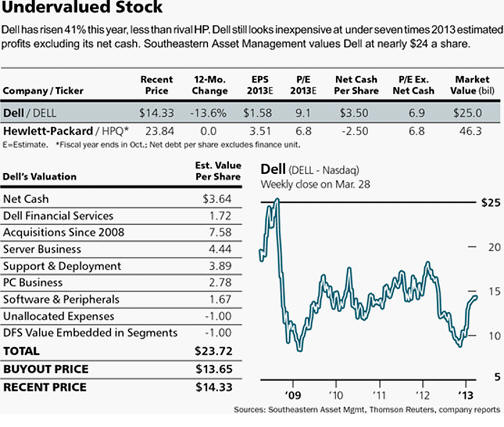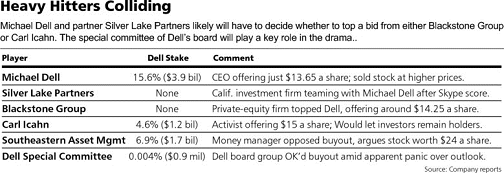Score one for
shareholders.
It doesn't look like
Michael Dell, founder, chairman, and CEO of
Dell, will be able to steal his company from public
shareholders for just $13.65 a share now that superior preliminary
offers for Dell have been submitted by Blackstone Group and activist
investor Carl Icahn.
It's harder than it
once was to buy businesses at unfairly low prices because
deep-pocketed investors like Icahn are prowling the markets for
opportunities. Moreover, big institutional holders are no longer
pushovers. The Dell buyout, first announced in early February,
probably was doomed due to widespread opposition from the company's
larger shareholders, including Southeastern Asset Management, with
7% of the shares, and T. Rowe Price.
|
![[image]](http://barrons.wsj.net/public/resources/images/BA-BB470_TOC_i_DV_20130330001418.jpg) Scott Pollack for Barron's
Scott Pollack for Barron's
|
|
Blackstone, led by CEO
Stephen Schwarzman, and Icahn admittedly aren't willing to pay much
more than the buyout price offered by Michael Dell and his sidekick,
Silver Lake Partners. But they will allow at least some Dell
shareholders to remain as investors in a publicly traded Dell. Under
the $24 billion deal initiated by Michael Dell, all investors would
be forced to sell.
Yet many Dell holders
believe the company, which sells personal computers, software, and
technology services, is worth more than $20 a share, based on its
earnings power, and want to participate in its potential revival.
Southeastern pegs Dell's value at almost $24 a share, based on
acquisitions that diversified the company's operations. Dell rose 19
cents, to $14.33, last week.
Blackstone has proposed
paying "in excess" of $14.25 a share for Dell -- it won't specify
how much more -- while Icahn is offering $15 for as much as 58% of
the Round Rock, Texas–based company.
Both proposals, which
came at the end of a 45-day "go shop" period for alternative offers,
amount to what Wall Street calls a leveraged recapitalization,
meaning a large chunk of stock would be retired. Investors who stick
around will be left with shares in a more debt-laden company that
offers both greater upside potential and downside risk than before.
Dell's share count, now nearly 1.8 billion, could fall to one
billion or less. Debt will rise with the recap, but likely not to
onerous levels.
|

Antoine Antoniol/Bloomberg
News; Tony Avelar/Bloomberg News; Edward Le Poulin/Corbis
Leading actors in
the Dell drama, from left: Blackstone Group's Stephen
Schwarzman, Dell CEO Michael Dell, and activist investor Carl
Icahn. |
|
OUR BET IS THAT
THE FINAL DEAL will give investors a chance to cash out at
$15 a share or more. Those who remain invested ultimately could wind
up with considerably more than $15, based on an analysis from
Southeastern and others. The stock surely looks inexpensive at just
nine times this fiscal year's projected profit of $1.57 a share, and
seven times estimated earnings after excluding the company's net
cash position (cash and marketable securities, less debt) of $6.3
billion, or $3.50 a share.
"Having the choice of
cashing out or staying in is hugely superior to what Michael Dell
had to offer," says Richard Pzena, co-chief investment officer at
Pzena Investment Management, which owns about 1% of the company.
"It's inconceivable that the Dell board can come to another
conclusion."
Barron's has
written critically -- and presciently -- about the Dell buyout bids
since before Michael Dell's was announced on Feb. 5. In a Jan. 21
story, "How
to Give Dell's Shareholders a Fair Deal," we wrote that a
then-rumored deal price of $14 a share significantly undervalued the
company and would run into shareholder opposition. We also
speculated that Dell could attract an activist investor like Icahn,
and argued that a better alternative to a buyout would be a tender
offer for Dell shares at $15 a share.
These events have since
occurred, even though most Wall Street analysts and media
commentators initially treated the Michael Dell deal as a near
certainty.
The coming battle may
be over investor participation in a publicly traded Dell, an issue
that has received little attention to date, amid coverage of the
Blackstone and Icahn bids. Any deal approved by Dell's board is
likely to enable at least some current shareholders to remain
invested.
Barron's
analysis suggests that half of Dell's holders would like to stay
invested in the company, which Michael Dell, 48, founded in 1984.
Icahn believes it is fair to offer them this opportunity, as his
proposal gives shareholders the option of staying in or cashing out.
Blackstone's
preliminary proposal is murkier on this score. Blackstone says it
plans to "cap" the number of investors that would be allowed to
remain as shareholders.
It isn't clear what
Michael Dell might offer in a counter proposal.
Under one scenario,
Blackstone potentially could form a "club" deal with Michael Dell,
Icahn, and perhaps another big holder, and then try to force out
most investors at about $15 a share. That likely would generate
strong investor objections, however, as well as lawsuits.
Let's do the
shareholder math: Michael Dell owns 16% of the company and is
unlikely to sell any shares at about $15, whether he's involved in
the winning group or not. Icahn, a 4% owner, won't sell at $15 and
wants to buy more stock at that price. Southeastern and T. Rowe
Price, a 4% holder, believe Dell is undervalued and probably won't
sell at $15. These four holders together own more than 30% of Dell,
and there are many smaller institutional holders, including Pzena,
and retail investors, who presumably want to stay invested.
WHY WOULD SO
MANY DELL HOLDERS want to stick with a company that has
little support from Wall Street and is widely derided as a has-been
by the media?

Dell's diversification
is reflected in Southeastern's analysis. The firm assigns a value of
just $2.78 a share to the PC business (see table), but assumes that
the Dell acquisitions are worth the price paid by the company. One
successful deal was for Quest Software, a $2.5 billion purchase last
year that probably is worth more than what Dell paid. Add Dell's
cash, server business, and financial arm, and the total value
approaches $24 a share.
Icahn values Dell at
more than $22 a share. Retiring a large chunk of Dell's shares would
boost the company's earnings per share, since likely debt costs of
about 6% are below the earnings yield of about 11%. (The earnings
yield is the inverse of the price/earnings ratio.)
This is evidently what
Michael Dell and Silver Lake see. Dell, who is worth an estimated
$15 billion, was a big seller of the company's shares a decade ago
when the stock traded above $30, and now senses opportunity. So does
Silicon Valley–based Silver Lake, a shrewd bottom-fisher in tech.
The private-equity firm led a group that bought 70% of Skype from
eBay (EBAY) for $1.9 billion in 2009, and then flipped it
to
Microsoft (MSFT) for $8.5 billion in 2011. As Ben Stein
wrote in Barron's, the Dell buyout proposal smacked of
insider trading because Michael Dell, who probably knows more about
the company than anyone, should be required to put shareholder
interests ahead of his own ("Dell
Deal: The Same as Insider Trading," Feb. 18).
That was echoed last
week by investment manager Leon Cooperman of Omega Advisors, who
told the New York Times, "Dell has a moral responsibility to work
for his shareholders."
Referring to the
buyout, Cooperman added: "He's not doing this because he thinks his
company is overvalued. He wants to make money."
THE FOUR-MEMBER
SPECIAL COMMITTEE of the Dell board that approved the
Michael Dell buyout deal apparently wasn't troubled by Dell's role.
That committee looked to be so concerned by Dell's weakening profits
that it OK'd the low-ball price. The committee defends itself,
stating that it "conducted a disciplined and independent process
intended to ensure the best outcome for shareholders."
The committee should
have done better, particularly since one of its members is Laura
Conigliaro, a former Goldman Sachs technology research analyst who
covered Dell as recently as 2007. As Barron's has reported,
Conigliaro had a $35 price target on Dell in October 2007, according
to a story posted at the time on MarketWatch.com, which also is
owned by Barron's parent Dow Jones. That target was in
place before she gave up her analyst responsibilities to become
co-head of Goldman's Americas research group. She retired from
Goldman as a partner in 2011.
Dell was much more
highly regarded in 2007 than now, but Conigliaro carried that $35
price target when the stock traded at $30 and the company had about
$1.30 of annual earnings power. She voted in favor of a deal at
$13.65, with Dell's profits having risen to $1.72 a share in 2012.
THE BUYOUT
PROXY, released late Friday, details the negotiations over
many months that led to the February deal and the eroding internal
financial projections that motivated the special committee to
embrace the Michael Dell offer. Because those internal projections
had been leaked prior to Friday in an effort to defend the buyout,
the numbers come as no surprise and probably will do little to sway
investors who oppose the deal.
Projections for
operating income in the fiscal year ending next January have come
down sharply since July, when the company was expected to report
$5.6 billion for the current fiscal year. The subsequently lowered
outlook is already reflected in current Wall Street estimates and
was known to the Dell board in January.
A revised March
management projection of $3.7 billion for the current year looks
consistent with the Street estimate of $1.58 a share in earnings. An
alternative and more conservative March projection, prompted by a
board request, is $3 billion. Dell maintains two internal
projections. The $3 billion is the leaked number that supposedly
underscores Dell's grim outlook, but it seems more of a worst-case
scenario than a likely outcome.
Even if Dell's
operating profit is only $3 billion in fiscal 2014, the company
still could earn about $1.30 a share for the year. That means the
special committee approved a buyout at 10 times a pessimistic 2014
forecast, or less than eight times earnings, excluding net cash. No
major company has ever gone private at such a low valuation.

THE DELL DRAMA,
which began last August with a discussion between Michael Dell and
Silver Lake, could go on for months because Blackstone and Icahn
need to firm up their bids with committed financing. Michael Dell
and Silver Lake would then get a chance to top any proposal deemed
superior by the special committee; Blackstone or Icahn would get
final topping rights.
Dell thus could waste a
year on a buyout ordeal that has distracted management from its
business challenges.
It is possible and
perhaps fitting that Michael Dell could lose his job under the terms
of the final deal. There have been leaked reports that he has talked
to Blackstone, which supposedly is amenable to his participation in
its buyout bid. But Blackstone, like most private-equity firms,
wants some control over businesses it buys, and might not want a
headstrong founder around to second-guess the firm.
Should Michael Dell
drop his bid and align with Blackstone, that would trigger a nice
payday for Silver Lake, which stands to pocket a $180 million
break-up fee.
The Michael Dell camp
has argued that absent a buyout, Dell stock would plunge. But that's
unlikely. Shares of rival
Hewlett-Packard (HPQ) are up 67%, to $24, this year, as
investors smell the early signs of a recovery. Dell shares are up
just 41% in the same period.
Dell's board made a
mistake in approving the Michael Dell buyout. It now has a chance to
redeem itself.